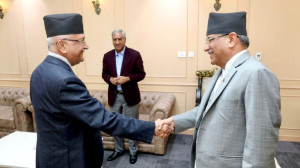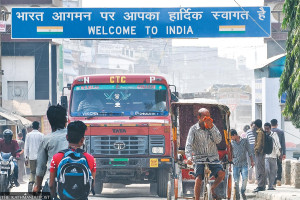 16.12°C Kathmandu
16.12°C KathmanduPolitics
Dahal fails to walk the talk on enacting laws demanded by provinces
Government struggles to present federal civil service bill as public staff protested against one proposed last year.
Post Report
Answering queries from National Assembly members, Prime Minister Pushpa Kamal Dahal said on September 4 last year that the government was in final preparations to register the federal civil service bill in Parliament.
He claimed that his government had no intention to further delay the bill. “The Cabinet will adopt the bill tomorrow [September 5] and it will be registered in Parliament very soon,” he had told the Assembly.
Five months later, appearing before the National Concerns and Coordination of the same chamber, Dahal reiterated that the government was in the final leg to register the bill in Parliament.
“The government is making final preparations to register the bill in Parliament,” he told the House Committee. For the last few months, he has made such claims on several occasions—in Parliament, at House committees and other functions.
In this period, all the provinces have been piling pressure on the Dahal administration to pass the civil service law. Led by Madhesh Province, leaders from the six other provinces came to Kathmandu several times to draw the attention of Singha Durbar to enact the law together with the one governing the police adjustment process.
On November 9, an all-party delegation from Madhesh Province issued a 30-day ultimatum to Dahal to address their six-point demand, warning of a protest if Kathmandu took no urgent steps to fully implement constitutional provisions for the smooth functioning of the provinces.
Dahal then promised to address the demands by the deadline, saying he would always support the mission to strengthen federalism. Promulgation of the Federal Civil Service Law was one of the points. As the House was in recess, Dahal even said he could forward an ordinance to the President to issue. But that didn’t happen.
On December 6, the Madhesh Provincial Assembly unanimously endorsed a resolution motion registered by the CPN-UML which said that the provinces should be allowed to exercise all the authorities delegated to them by Schedule 6 of the constitution including the setting up of their own bureaucracy and police forces. Led by the Madhesh chief minister, representatives from all the provinces submitted their joint decision to Dahal. He then sought 15 days to address them. Dahal, however, failed to abide by his commitment.
At the National Coordination Council meeting on February 7, the prime minister reiterated the commitment to enacting the laws immediately. However, it is still unclear when Dahal’s words will translate into action.
“We are waiting for the federal government to implement its commitments,” said Mohammad Samim, the internal affairs minister in Madhesh. Eight years since the promulgation of the Constitution of Nepal, the Civil Service Act is yet to be promulgated. The explicit responsibility to manage provincial police administration and provincial civil service rests with provincial governments, as per the statute.
Successive governments have not been able to present the bill for Parliament’s endorsement following the pressure from civil servants. The bill drafted by the government last year had a provision for 80 percent of officer vacancies to be filled through open competition, allocating only 20 percent seats for departmental promotions. It also proposed 40 years as the maximum age for in-service employees to compete for higher positions. The civil servants resorted to a protest against the bill demanding 50 percent officer positions reserved for in-service staff and scrapping the age limit. The government succumbed to their demands.
The provincial governments want the chief administrative officer and the provincial secretary to work under them. However, neither the federal government nor civil servants want these positions to come under the provinces. They want the two positions to be managed under the federal administration.



















